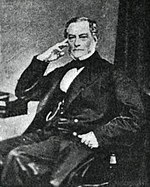Thomas Grubb, Date of Birth, Place of Birth, Date of Death
TweetThomas Grubb
Irish engineer and telescope builderAbout Thomas Grubb
- Thomas Grubb (4 August 1800 – 19 September 1878) was an Irish optician and founder of the Grubb Telescope Company. He was born near Portlaw, County Waterford, Ireland, the son of William Grubb Junior, a prosperous Quaker farmer and his second wife, Eleanor Fayle. Thomas started out in 1830 in Dublin as a metal billiard-table manufacturer.
- He diversified into making telescopes and erected a public observatory near his factory at 1 Upper Charlemont Street, Portobello, Dublin.
- As makers of some of the largest and best-known telescopes of the Victorian era, the company was at the forefront of optical and mechanical engineering.
- His innovations for large telescopes included clock-driven polar mounts, whiffletree mirror mounting cells and Cassegrain reflector optics.Grubb helped build the famous telescope for William Parsons, 3rd Earl of Rosse, at Parsonstown (now known as Birr), County Offaly, Ireland.
- One of his earliest instruments - the telescope for Markree Observatory in County Sligo in the West of Ireland, supplied in 1834 - was, for several years, the largest telescope in the world.
- It was used to sketch Halley's comet in 1835 and to view the solar eclipse of 15 May 1836.Later he built telescopes for observatories worldwide, including Aldershot Observatory, Melbourne, Vienna, Madrid and Mecca and others.He died in 1878 and is buried at Mount Jerome Cemetery, Dublin, Ireland.
- He had married Sarah Palmer.
- Their youngest son was Sir Howard Grubb, who took over the optical business.
- Thomas Grubb's cousin, John Grubb Richardson (1813 - 1891) was a major Irish industrialist who founded the model village of Bessbrook.
Read more at Wikipedia
See Also
- Famous People's Birthdays on 04 August, Ireland
- Famous People's Birthdays in August, Ireland
- Famous astronomer's Birthdays on 04 August, Ireland
- Famous astronomer's Birthdays in August, Ireland
- Famous lens designer's Birthdays on 04 August, Ireland
- Famous lens designer's Birthdays in August, Ireland


 Date of Birth:
Date of Birth:  Place of Birth: Waterford, Munster, Ireland
Place of Birth: Waterford, Munster, Ireland